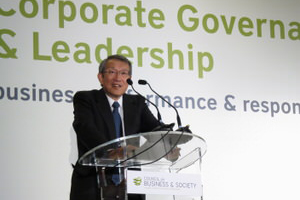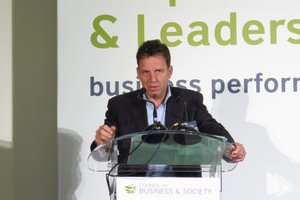CoBS東京フォーラム 開催報告
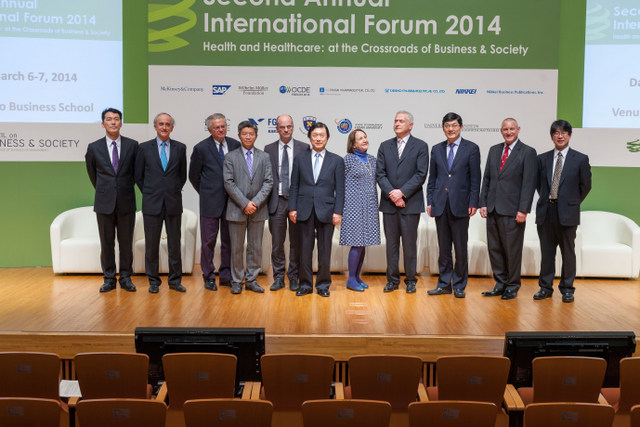
2014年3月6日(木)~7日(金)に、慶應義塾大学日吉キャンパス協生館にて、Council on Business & Society(ビジネスと社会に関する評議会、以下「CoBS」)第2回年次国際フォーラムが開催されました。
当日は加盟校6校の関係者、教員、現役生、関係企業の方々などを合わせて世界各国からのべ約290名が参加し、盛況となりました。
今回のフォーラムでは全体のテーマとして「Health and Healthcare」を取り上げ、3つあるセッションそれぞれの中で基調講演、パネルディスカッション、分科会が開催されました。
フォーラムは、ホスト校であるKBSの河野宏和・経営管理研究科委員長によるウェルカムスピーチから始まり、続いて公団法人医療科学研究所理事長の江利川毅氏と中外製薬株式会社代表取締役会長の永山治氏による基調講演が展開されました。その後、第1セッション「Healthy Employees, Healthy Corporations」が始まり、従業員の健康管理に対して企業が果たすべき役割や従業員のメンタルヘルスの諸問題に関して討論が繰り広げられました。
2日目の午前に展開された第2セッション「Technology and Management Innovations in Healthcare」はSAP社ヘルスケア分野のSenior Industry Advisorを努めるMartin Burger氏の基調講演でスタートし、ソフトウェア企業の立場から、技術はヘルスケアに対して、改善(improvement)・解析(analysis)・効率(efficiency)という3つの側面から貢献できると論じました。
その後は、技術・経営・ビジネスモデルを各主題とする3つの分科会が開催され、健康管理システムの重要性などについて各国の実例を取り上げながらディスカッションが進められました。
午後の第3セッション「Challenges in Managing Healthcare:Who Pays for Healthcare and How It Is Supplied?」では、各国のヘルスケアマネジメントにおける課題について議論され、理想のヘルスケアシステムについて活発な議論が交わされました。
全セッション終了後は6校の代表者による記者発表会を行い、各メディアに対してフォーラムの成果や提言を発信しました。
関連リンク
- ヘルス&ヘルスケア領域で経済的成功と社会貢献の両立のために提言(日経Bizアカデミー)
- 「技術はヘルスケアに改善/解析/効率の3側面から貢献」「中国ではIT健康管理が重要に」…、ヘルスケアをテーマにした国際フォーラムが慶応大で開催(日経デジタルヘルス)
- 慶応ビジネススクールが「ヘルスケア」をテーマに国際フォーラム「高齢化は医療費増の主要な推進因子ではない」(日経メディカルオンライン)
- 国際フォーラムで知った米国の意外な常識(ヒューマンキャピタルオンライン)








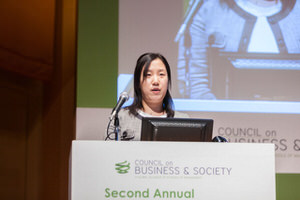

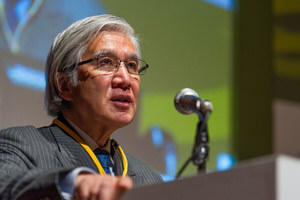

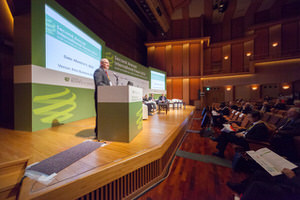
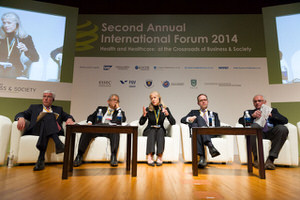
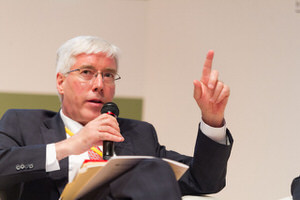
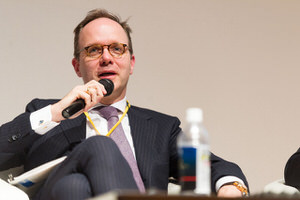
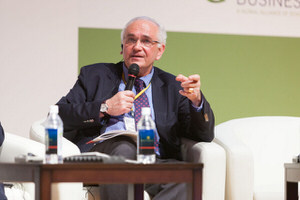












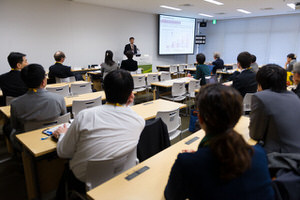
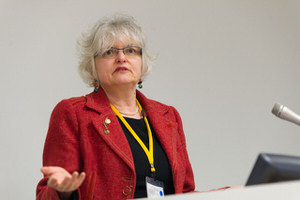
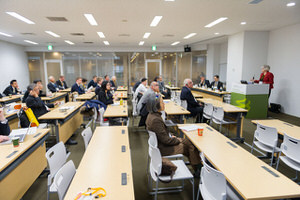


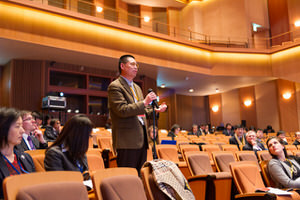
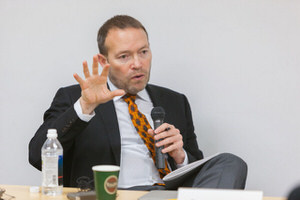

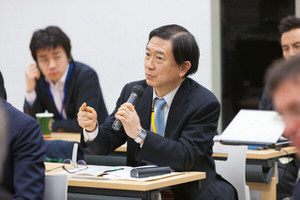










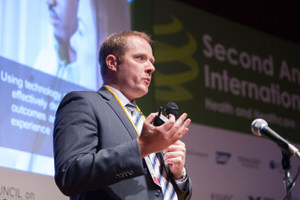






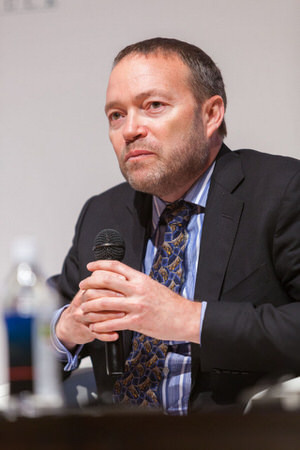
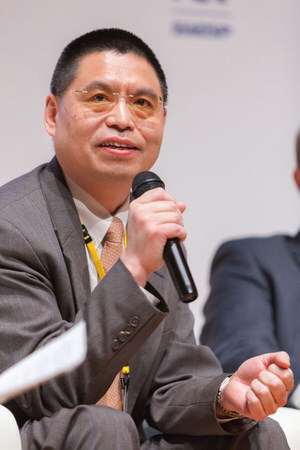
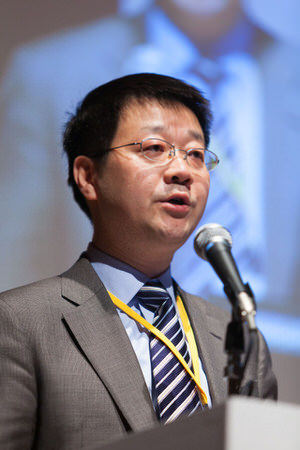
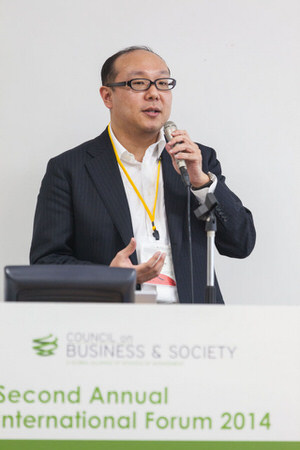
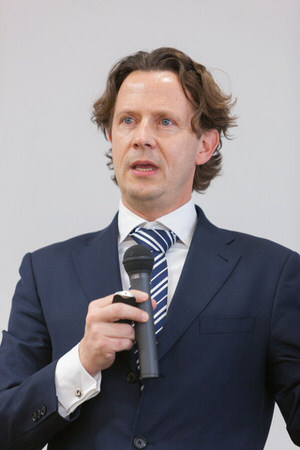

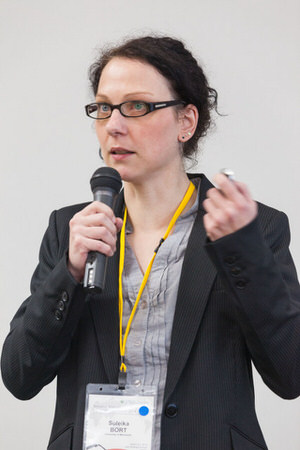
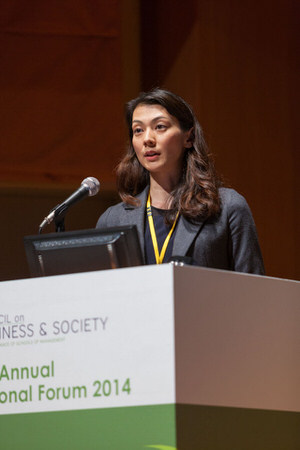

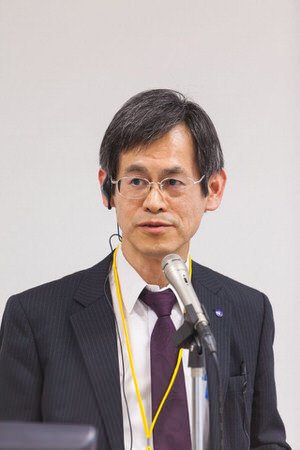
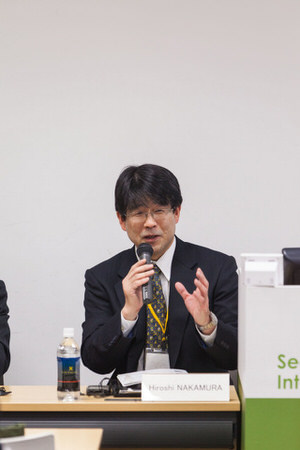
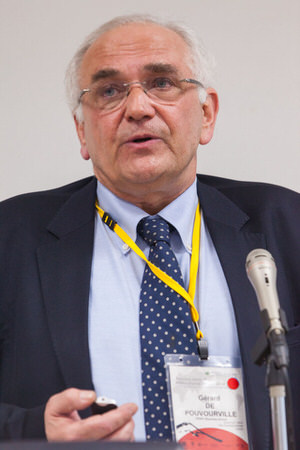
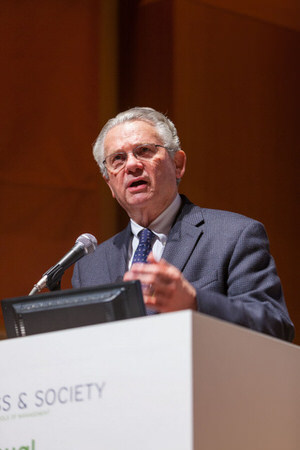
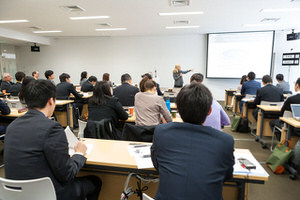
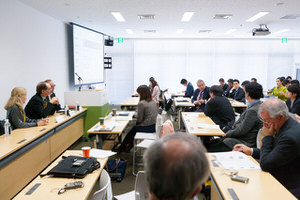




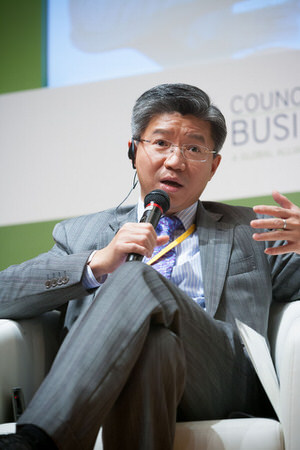


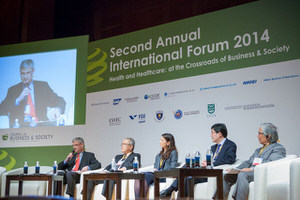




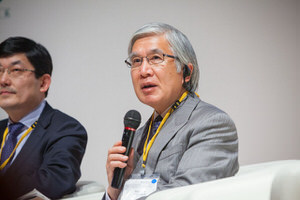
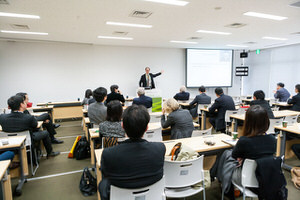
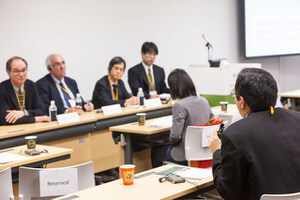



CoBS東京フォーラム 開催概要
| テーマ | 「Health and Healthcare: at the Crossroads of Business and Society」 |
|---|---|
| 日時 | 2014年3月6日(木)13:30~ (開場12:30) 2014年3月7日(金)9:00~17:05 |
| 場所 | 慶應義塾大学日吉キャンパス 協生館2F 藤原洋記念ホール |
※本フォーラムは完全招待制となっております。
|
慶應義塾大学ビジネス・スクール (以下KBS)は、2011年にダートマス大学タック・スクール・オブ・ビジネス(アメリカ)、エセック経済商科大学院大学(フランス)、マンハイム大学ビジネススクール(ドイツ)、復旦大学ビジネススクール(中国)と提携し、「Council on Business and Society(ビジネスと社会に関する評議会、以下CoBS)」を設立しました。2012年にはブラジルのファンダサウン・ゲットゥーリオ・ヴァルガス大学(FGV)も参加し、現在は6ヶ国のトップ・ビジネススクールからなる国際共同研究・教育のアライアンスです。
第2回国際フォーラム ~日本~
2014年3月にKBS主催で開催予定の次回フォーラムは、「Health and Healthcare: at the Crossroads of Business and Society(健康とヘルスケア ビジネスと社会の十字路)」をテーマとして取り上げます。先進国の中で最も高齢化率が高い日本では、創薬や介護ロボット等に関わるイノベーションや働く人たちのメンタルケアなど、ヘルスケアに関わる様々な課題を抱えており、新たな試みが国策として検討され順次導入されつつあります。 メンバー各校がそれぞれの地域特有の問題について意見を交換し世界共通の課題を抽出、産・官・学、各界のリーダーと学生の参加も得て議論を交わし、世界に向けた提言を発信します。加えて、その成果を日本の政策、産業、研究に携わる人々に広く伝え、共有していくことも目指しています。
プログラム
Thursday, March 6th PM
-
12:30-13:30
Registration Start Lobby
-
13:30-14:45
Welcome Address Fujiwara Hall
Dean Hirokazu Kono, Keio Business SchoolKeynote Address Fujiwara Hall
Mr. Takeshi Erikawa, Former Vice-Minister, Japanese Ministry of Health, Labor and WelfareFeatured Speech Fujiwara Hall
Mr. Osamu Nagayama, Chairman & CEO, Chugai Pharmaceutical Co.,Ltd.Result of International Student Survey Fujiwara Hall
Student Council FellowsIntroduction Fujiwara Hall
Prof. Shigeru Tanaka, Keio Business School
-
14:45-15:15
UNIT 1 "Healthy Employees, Healthy Corporations"
Employer engagement in employee health is an important issue, not just from the cost and regulatory perspective but from a strategic perspective. How do countries differ in regard to employee health issues and why is that? Is employer-based health coverage the only reason for employer interest or is it broader? What are the important themes in employee health world-wide? What are examples of best practices? Are we seeing global convergence in the role of corporations and employee health?第1部「健康な従業員、健全な企業」
雇用者が従業員の健康管理に取り組むことは、コスト負担や規制対応の観点のみならず、企業戦略の観点からも重要です。従業員の健康問題は、各国においてどのように異なるのでしょうか。またそれはなぜでしょうか。雇用者が従業員の健康問題に関心を寄せるのは、健康保険料の雇用者負担に対する懸念からだけでしょうか、それとももっと幅広い見地からでしょうか?従業員の健康管理を論じる上でグローバルに重要視されるテーマとは?従業員の健康管理において企業が果たすべき役割とは?どうすれば企業がより関心を高めるでしょうか?どのような模範的事例があるでしょうか?従業員の健康管理における企業の役割について、その見解は世界的に共通したものとなりつつあるでしょうか? -
Plenary Address Fujiwara Hall
Mr. Axel Baur, Senior Partner, McKinsey and Company Tokyo Office -
15:15-16:15
Plenary Panel Fujiwara Hall
"Healthy Employees, Healthy Corporations"
For each country represented, what are the major issues in regard to the corporation’s role in employee health? What is motivating the corporation’s interest? Is employee health a strategic issue? What are examples of best practice? Are we seeing global convergence in the role of corporations and employee health?全体討論 「健康な従業員、健全な企業」 藤原洋記念ホール
講演者が代表する各国では、従業員の健康管理に対して企業が果たすべき役割についてどのような問題が重要視されているでしょうか。どうすれば企業がより関心を高めるでしょうか?従業員の健康管理は企業にとって戦略的課題であると言えるでしょうか?どのような模範的事例があるでしょうか。従業員の健康管理における企業の役割について、その見解は世界的に共通したものとなりつつあるでしょうか?Moderator Prof. Robert Hansen, Tuck School of Business, Dartmouth College
Prof. Gérard de Pouvourville, ESSEC Business SchoolSpeakers Mr. Axel Baur, Senior Partner, McKinsey and Company Tokyo Office
Dr. Alberto Jose Ogata, President, Brazilian Quality of Life Association
Prof. Elizabeth Teisberg, Geisel School of Medicine, Dartmouth College -
16:15-16:45
Coffee Break Lobby
-
16:45-18:00
Parallel Session (1.1) Fujiwara Hall
"Employee Health as a Strategic Imperative"
Every employer has a strategic interest in the health of its employees. Regardless of whether they are directly involved in their country’s health care financing, health is a strategic issue. Beyond the costs of health care, employees’ health affects a company’s productivity and morale, rates of absenteeism and presenteeism, and its losses from disability and early retirement. This panel will discuss taking a strategic approach to employee health and its ramifications to a company’s success.分科会(1.1)藤原洋記念ホール
「経営戦略上不可欠な従業員の健康管理」
いかなる雇用者も、経営戦略を図る上で従業員の健康管理を念頭に置きます。それは国家の医療財政に直接関与するか否かに関係なく経営戦略上の課題となります。企業が従業員の健康状態によって影響を受けるのは医療費負担に留まりません。事業の生産性、従業員の士気や勤怠率、さらに従業員が障害を抱えたり早期退職したりすることになれば欠員が生じ多分に影響を受けます。本分科会では、従業員の健康管理を経営戦略に組み込むことで、いかに企業を成功に導くべきか議論します。Moderator Prof. Robert Hansen, Tuck School of Business, Dartmouth College Speakers Mr. Geoff McDonald, Global Vice President Human Resource for Talent, Marketing, Communications, Sustainability & Water, Unilever Corporation
Prof. Elizabeth Teisberg, Geisel School of Medicine, Dartmouth CollegeParallel Session (1.2) Session Room #1
"Implementing a Strategy for Employee Health"
A strategic approach to employee health involves an array of activities that support and improve health for employees. Worldwide, employers can improve the health of employees by taking an active role in creating health benefits, designing the work environment and influencing the care delivery available to employees. This panel will consider the leading trends in each of these areas, the consequences of employers’ actions on the health of employees, and the implications for success.分科会(1.2)多目的教室1
「従業員の健康のために遂行すべき経営戦略とは」
従業員の健康増進に対して戦略的に取り組むには、従業員の健康を支援・改善し得るあらゆる施策を取り入れることになります。医療給付の実施、よりよい職場環境の整備、従業員が活用できる医療サービス提供の支援など、あらゆる施策に雇用者が積極的に取り組むことで従業員の健康改善が実現するというのは世界的な共通見解です。本分科会では、こうした雇用者が取り組むべき施策の最前線を取り上げ、その成果、成功要因を検証していきます。Moderator Prof. Jonathan Skinner, Dartmouth College Speakers Dr. Hideyuki Ban, Hitachi Corporation
Ms. Betsabeh Madani, Cerner Corporation
Prof. Scott Wallace, Geisel School of Medicine, Dartmouth CollegeParallel Session (1.3) Session Room #2
Psycho-Social Risks in the Work Place: Does Management Care?"
Psycho-social risks cover a wide array of health issues related to the working environment—stress, burn-out, harassment, depression and other psychological problems. Because they have received attention primarily from sociologists and psychologists, they may have been either underestimated or ignored by management. ‘In this session, existing evidence of the importance of such health issues and their impact on ‘efficiency of employees will be presented, as well as their relation with organizational and ‘managerial contexts, with the aim of identifying preventative solutions.分科会(1.3)多目的教室2
「職場環境における社会心理的リスク: マネジメントは重要視しているか?」
企業が抱える社会心理的なリスクには、ストレスや過労、いじめ、うつ病、勤務問題による自殺やその他の心理的障害を含め、職場環境に絡んだあらゆる健康問題が内包されています。こうした問題は、まず社会学者や心理学者が取り上げてきたことから、これまで経営者たちには軽視され、あるいは最終的に無視されてきました。本分科会では、こうした健康問題の重要性を示す実例や、従業員の業務効率に与える影響について議論し、組織や経営との因果関係を検証することによって予防策を探ります。
Moderator Prof. Gérard de Pouvourville, ESSEC Business School Speakers Prof. Annick Ancelin-Bourguignon, ESSEC Business School
Prof. Naotaka Watanabe, Keio Business School
Prof. Adrian Zicari, ESSEC Business School -
18:00-20:00
Grand Reception Event Hall
Friday, March 7th AM
-
8:00-9:00
Registration Start Lobby
UNIT 2 "Technology and Management Innovations in Healthcare"
Emerging technologies are transforming both management and healthcare. Unit 2, “Technology and Management Innovation in Healthcare”, addresses the following issues.
(1) How new technologies have been and can be used to impact healthcare.
(2) Along with technical innovation, how management innovations are transforming the traditional practices in healthcare.
(3) How the innovation in both technology and management give rise to creative new business models, which transcends the prevailing practice, and create values unavailable before. Insights and experiences from both industry and academia will be shared in this unit.第2部 「ヘルスケアにおける技術革新と経営革新」
技術の進歩により、企業経営もヘルスケアもいずれも変貌を遂げてきました。第2部では「医療産業における技術革新と経営革新」と題し、以下三点を中心に議論してまいります。(1)医療産業において新しい技術がこれまでどのような影響を与えてきたか、そして今後与え得るか。(2)技術革新に伴う経営革新によって、ヘルスケアの現場にどのような変貌がもたらされているか。(3)技術革新と企業経営革新により、新しいビジネスモデルがどのように樹立されていくのか、そしてその新モデルがどのように現状を変え、これまでになかった新たな付加価値を生み出していくのか。 本分科会では、産学双方の識見と現場経験を踏まえ議論を進めます。
-
9:00-9:30
Plenary Address Fujiwara Hall
Mr. Martin Burger, Senior Industry Advisor Healthcare, SAP APJ -
9:30-10:30
Plenary Panel Fujiwara Hall
"Technology and Management Innovations in Healthcare"
How will technological, managerial, and business model innovations reshape the healthcare sector? How is information technology being used at the macro and the micro level? How do technological and managerial innovations impact the quality and cost of healthcare?全体討論 「ヘルスケア産業における技術革新と経営革新」 藤原洋記念ホール
ヘルスケア産業は、技術、経営、そしてビジネスモデルの革新によってどのような変貌を遂げいくでしょうか?情報技術は、マクロ、ミクロ双方の視点から、どのように活用されてきたと言えるでしょうか? 技術革新と経営革新によって、ヘルスケアの質とコストはどのような影響を受けるのでしょうか?Moderator Prof. Ana Malik, FGV-EAESP
Prof. Yunjie Xu, School of Management, Fudan UniversitySpeakers Mr. Martin Burger, Senior Industry Advisor Healthcare, SAP APJ
Ms. Betsabeh Madani, Cerner Corporation
Prof. Martin Pohl, University of Tsukuba
Prof. Scott Wallace, Geisel School of Medicine, Dartmouth College
Dr. Jianwei Xuan, Senior Director, Emerging Markets Business Units, Pfizer Corporation -
10:30-11:00
Coffee Break Lobby
-
11:00-14:00
Parallel Session (2.1) Fujiwara Hall
"Innovative Technology Applications in Healthcare"
Technology, especially information technology, has transformed the way health care is delivered, the way healthcare organizations are managed, and the way patients interact with the health care system. Have different countries adapted these changes at different rates and if so, why? What impact have those changes had on the quality and cost of healthcare?分科会(2.1) 藤原洋記念ホール
「ヘルスケア産業の最先端技術を活かすには」
医療サービスの提供方法、医療組織の運営方法、そして患者と医療制度との関係は、あらゆる技術革新の中でも特に情報技術の進歩によって変革を遂げてきました。こうした変革に対する順応度は国によって異なるでしょうか。異なるとすればそれはなぜでしょうか?こうした変革によって、ヘルスケアのコストと質にはどのような影響がもたらされたでしょうか。Moderator Prof. Yunjie Xu, School of Management, Fudan University Speakers Prof. Yingyao Chen, School of Public Health, Fudan University
Prof. Martin Pohl, University of Tsukuba
Prof. Scott Wallace, Geisel School of Medicine, Dartmouth CollegeParallel Session (2.2) Session Room #1
"Business Model Innovations in Healthcare"
New ways of organizing health care suppliers are being suggested by academics and policy makers worldwide, and the health care industry is engaging in significant business model innovation. These ideas and experiments include the "accountable care organization" in the United States; value-based competition; and increased consolidation, including across-borders. Many of these innovations also rely on changes to methods of paying for health care, generally moving from fee-for-service to payment based on population health and global budgets. Will these innovations work?分科会(2.2) 多目的教室1
「ヘルスケアにおけるビジネスモデル革新」
現在、世界各国の学界や政府レベルでは、ヘルスケア・サービスの提供機関を取りまとめる新しい組織体制が諸案提唱されており、それを受けたヘルスケア産業界ではビジネスモデルの大変革期を迎えています。その諸案や実施例としては、米国の「Accountable Care Organization」(通称ACO、複数の医療機関や医師などによる民間の医療統合組織)が挙げられます。また、提供される医療行為の質による競合、従来の垣根を越えた組織統合などもそのひとつです。同時に、これらの変革の多くは、ヘルスケア・サービスに対する支払い方法を、従来のサービス対価としての支払いから、住民数と予算を基にした人頭払いへと移行していくことも目指しています。このような変革は果たして機能するのでしょうか?Moderator Mr. Hiroto Furuhashi, Associate Principal, McKinsey and Company Tokyo Office Speakers Prof. Jonathan Skinner, Dartmouth College
Prof. Elizabeth Teisberg, Geisel School of Medicine, Dartmouth CollegeParallel Session (2.3) Session Room #2
"Management Innovations in Healthcare"
To control cost and improve quality, managers in health care companies are emphasizing new management practices. What are some of the new practices, where are they coming from, and what results are being achieved?分科会(2.3) 多目的教室2
「ヘルスケア・マネジメントの革新」
ヘルスケア業界の事業者たちの間では、コストを抑えつつ質を向上させるため、新しい経営手法を取り入れることが重視されています。こうした新手法にはどのようなものがあり、どのような背景で生まれ、そしてこれまでどのような成果を上げているのでしょうか?Moderator Prof. Ana Malik, FGV - EAESP Speakers Dr. Suleika Bort, University of Mannheim Business School
Prof. Michael Woywode, University of Mannheim Business School
Dr. Jianwei Xuan, Senior Director, Emerging Markets Business Units, Pfizer Corporation -
12:00-
Luncheon Event Hall
President's Welcome
Prof. Atsushi Seike, President, Keio University
Friday, March 7th PM – Afternoon Session
-
Registration Continues Lobby
UNIT 3 "Challenges in Managing Healthcare: Who Pays for Healthcare and How Is It Supplied?"
Each country has to answer the questions of who pays for healthcare and how it is supplied. How does a country adjust its answers to these questions given demographic changes? How does a country decide what structure and investments will lead to higher productivity and lower costs? How are the answers to those questions influenced by corporations and patients?第3部 「ヘルスケアマネジメントにおける課題:ヘルスケアのコスト負担は誰が負うべきか?その提供方法は?」
ヘルスケアについて議論する際、必要なコストを誰が負担し、そしてどのようにサービスが提供されるべきかという課題は、いずれの国家も答えていかなければならない命題です。人口変動に伴い、国はその命題への回答をどのように調整していくのでしょうか。どのような制度設計にどのように投資すれば、コストを抑えながらより高い生産性を確保できるのでしょうか?またこうした課題に対する各国の対応は、企業や患者によってどのような影響を受けているでしょうか? -
13:30-14:00
Plenary Address Fujiwara Hall
Ms. Yuki Murakami, Health Economist/Policy Analyst, OECD -
14:00-15:00
Plenary Panel Fujiwara Hall
"Challenges in Managing Healthcare: Who Pays for Healthcare and How Is It Supplied?"
For each country represented, what are the major challenges in managing healthcare? Who pays for healthcare and how it is supplied? Thinking a world of five years from now, what kind of healthcare program should a global business which employs a lot of people in each of different countries be desired to have?全体討論 「ヘルスケアマネジメントにおける課題:ヘルスケアのコスト負担は誰が負うべきか?その提供方法は?」
講演者の代表国において、ヘルスケア・マネジメント上の主要な課題にはどのようなものがあるでしょうか?そのコストは誰が負い、どのようにサービスが提供されているでしょうか?様々な国に従業員を有するグローバル企業は、5年後の世界を見据え、どのようなヘルスケアプログラムを導入すべきでしょうか?Moderator Prof. Bernd Helmig, University of Mannheim Business School
Prof. Shigeru Tanaka, Keio Business SchoolSpeakers Prof. Wen Chen, School of Public Health, Fudan University
Ms. Yuki Murakami, Health Economist/Policy Analyst, OECD
Dr. Alberto Jose Ogata, President, Brazilian Quality of Life Association -
15:00-15:30
Coffee Break Lobby
-
15:30-16:40
Parallel Session (3.1) Fujiwara Hall
"The Stakeholder's Roles: All Power to the Patients?"
Patients are, by necessity, consumers of health care services. What role should they play in the decision making process: in choosing their health care provider, their course of treatment, etc.? How can they be made to feel more in control and what role can technology (telemedicine) and patient communities (such as support groups) play in enhancing patients’ participation in the system?分科会(3.1) 藤原洋記念ホール
「利害関係者の役割:全権は患者にあるべきか?」
医療産業のサービス利用者は、特有の状況下に置かれています。概して患者は医療サービスを享受する上で主導権がないと感じています。ここで問題となるのは、患者がより主導権を握っていると感じられるような医療サービスを提供するにはどうしたらよいかということです。治療を受ける際、医療サービスの提供者を自身で選択できるような権利を患者に与えるべきでしょうか?一方で、サービス利用者であれ患者であれ、医療とは必要に迫られて利用するものであり望んで利用するものではないことから、医療提供者と共に治療の決定権を有することに抵抗を覚える場合もあります。このような抵抗を示す患者・利用者に対し、共に意思決定できるように促すために医師ができることは何でしょうか。同じく患者の自発性を促すために、遠隔医療などの最先端技術や、サービス利用者、支援団体を含む一般社会が果たせる役割とは何でしょうか。Moderator Prof. Michael Woywode, University of Mannheim Business School Speakers Dr. Eishu Hai, CEO, Medixfirm Co., Ltd.
Prof. Bernd Helmig, University of Mannheim Business School
Mr. Eisuke Suzuki, CEO, Medical Insight CompanyParallel Session (3.2) Session Room #1
"Productivity and Cost: What Do we Pay for and Invest in?"
While advancements in technology have contributed to increased productivity in the healthcare sector, they have also led to a significant increase in costs in many countries. To balance "productivity" and "costs," society must decide what we will pay for and how we will invest our resources.分科会(3.2)多目的教室1
「生産性とコスト:何にコストをかけ、何に投資すべきか?」
技術の進歩によってヘルスケア産業の『生産性』は向上しましたが、一方でそれに比例して増大するコストの問題に各国が直面しています。ヘルスケア産業の『生産性』と『コスト』のバランスを図るためには、「何にコストをかけ、何に投資すべきか?」という議論が避けられません。Moderator Prof. Hiroshi Nakamura, Keio Business School Speakers Mr. Mitsuru Kikuchi, Chugai Pharmaceutical Co., Ltd.
Prof. Gérard de Pouvourville, ESSEC Business School
Prof. Jonathan Skinner, Dartmouth CollegeParallel Session (3.3) Session Room #2
"What Is Better Healthcare System Like?"
Challenges for a national healthcare system depend on the nation-specific factors like demography, government budget and the value systems in the society. What can we learn from practice and knowledge of healthcare system of nations?分科会(3.3)多目的教室2
「理想のヘルスケアシステムとは?」
国家のヘルスケアシステムが抱える課題は、人口や国家予算、社会的価値観など、各国固有の要因によって異なります。各国のヘルスケアシステムに見られる施策と識見から何を学ぶことができるでしょうか?Moderator Prof. Shigeru Tanaka, Keio Business School Speakers Prof. Wen Chen, School of Public Health, Fudan University
Ms. Yuki Murakami, Health Economist/Policy Analyst, OECD -
16:40-17:05
Closing Address Fujiwara Hall
Mr. Genki Oka, Partner, McKinsey and Company Tokyo Office Dean Paul Danos, Tuck School of Business, Dartmouth College -
17:15-
Press Conference Fujiwara Hall
参加校

慶應義塾大学ビジネス・スクール
www.kbs.keio.ac.jp

Tuck School of Business at Dartmouth
www.tuck.dartmouth.edu
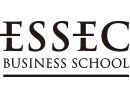
ESSEC Business School
www.essec.edu

University of Mannheim, Business School
www.bwl.uni-mannheim.de/en

School of Management, Fudan University
www.fdsm.fudan.edu.cn/En

Fundação Getulio Vargas São Paulo
portal.fgv.br/en
コーポレートパートナー

McKinsey & Company
www.mckinsey.com

SAP
www.sap.com

Wilhelm Müller Foundation

Organisation for Economic Co-operation and Development (OECD)
www.oecd.org

大正製薬
www.taisho.co.jp
アクセス
住所
〒223-8526 横浜市港北区日吉4-1-1
慶應義塾大学日吉キャンパス内 協生館
交通アクセス
・東急東横線、東急目黒線
・横浜市営地下鉄グリーンライン
日吉駅下車、徒歩1分
渋谷~日吉 : 25分(急行約20分)
横浜~日吉 : 20分(急行約15分)
新横浜~菊名~日吉 : 20分
※東急東横線の特急は日吉駅に停まりません。
Council on Business and Societyとは
目的・理念
CoBSは、その名が示す通り、「ビジネスに関わる全ての個人・組織体は、経済的な収入や利益の追求だけでなく、広く全世界の人々の幸福と社会の厚生に貢献しなければならない」という理念の下に活動しています。ビジネスにおいては、社会的な貢献よりも経済的な対価が優先されることが多くあります。しかし、我々は「ビジネスと社会の望ましい関係」をグローバルかつ文化横断的に議論し、そしてその成果を広く社会へ発信することが世界のトップスクールの責任だと考えています。第1回国際フォーラム ~フランス~
2012年11月にパリで開催した第1回国際フォーラムは、「Corporate Governance and Leadership」というテーマの下、「新しいガバナンスやリーダーシップのあり方とは」、「各国のガバナンスやリーダーシップから、互いに学べる点とは」といった問題意識に基づいて討論しました。日本からは前金融庁長官 三國屋勝範氏がパネリストとして登壇した他、KBSの学生、同窓生、教員が参加し、KBSの学生チームによる、日本企業のコーポレート・ガバナンスの特徴や事例に関する研究も発表されました。その詳細は後日White Paperにまとめられ、関係者やメディアを通じて広く発信されました。












